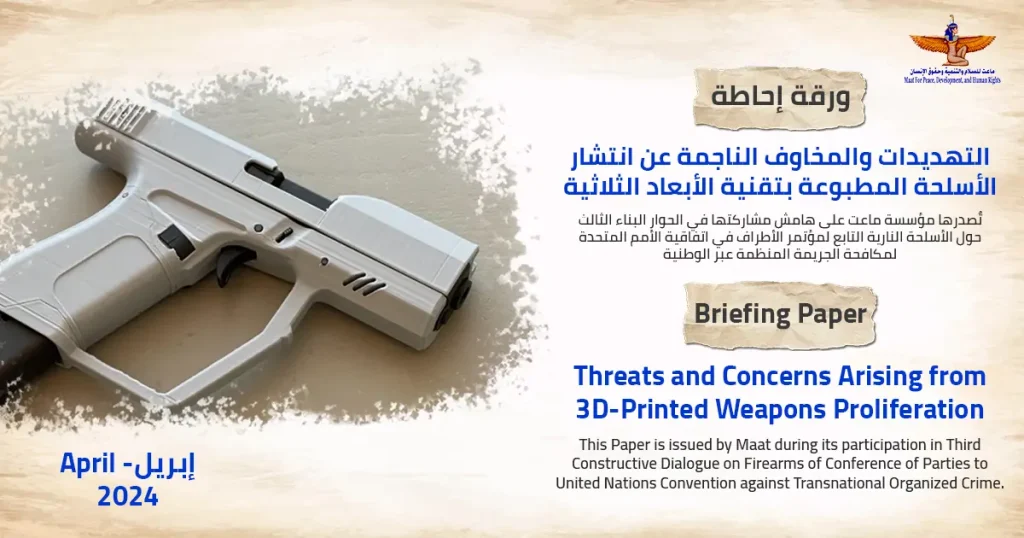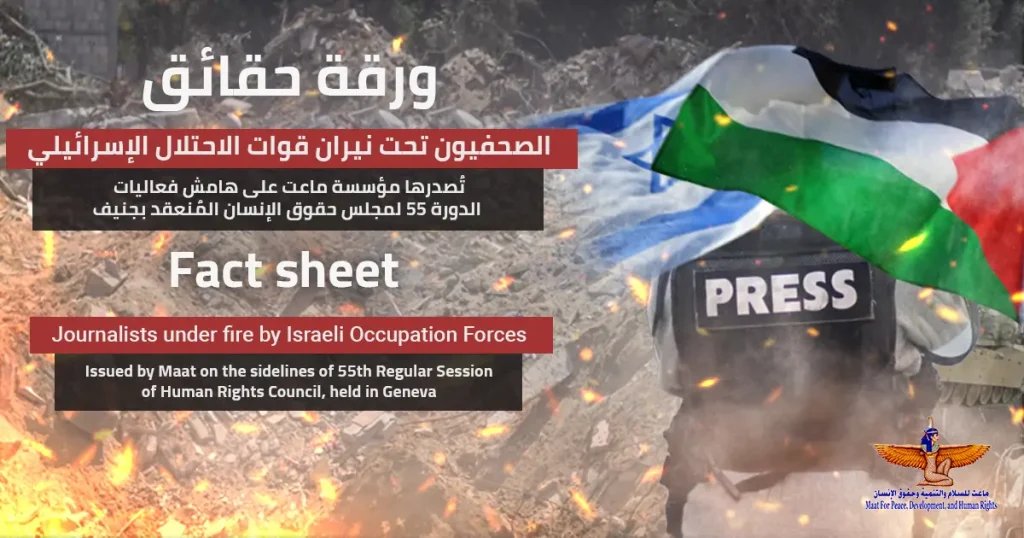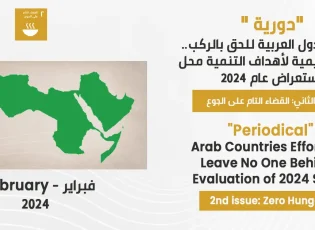Okeil: Armed conflicts and external interventions are the key reasons behind the perpetuation of terrorist operations in the Arab Region
Sherif Abdul-Hamid: A comprehensive Arab strategy for combating terrorism must be adopted
Maat for Peace, Development and Human Rights has issued its quarterly report on terrorism in the Arab Region, which monitored all terrorist operations and relevant activities as well as the interactions within the terrorist groups during the period from July to September 2021. The report based its monitoring and analysis on several research approaches and survey methodologies in order to achieve maximum benefits and come up with the most accurate results.
The report, which is entitled “Terrorism Index in the Arab Region”, pointed out that terrorist operations in the Arab region have slightly increased in the third quarter of 2021 compared to the terrorist operations for which terrorist organizations have claimed responsibility in the second quarter, but were significantly higher than the operations carried out by the same armed organizations during the first quarter of the year. The report monitored 214 terrorist operations during the period from July 1 to September 30 2021, compared to about 212 operations in the second quarter and 162 operations in the first quarter of 2021. Several terrorist operations continued to be carried out in the Arab countries suffering from raging armed conflict as well as those experiencing difficult transition periods, such as Somalia, Iraq, Syria and Yemen. In contrast, Arab countries with stable governance systems, booming economies and are not parties to any external conflicts have not experienced any terrorist operations since the beginning of the year.
About 406 civilians and military personnel were killed in those terrorist operations and 496 were injured, including women, children and elderly people, in a clear contravention of the international human rights and humanitarian law. There were about 54 terrorist attacks against civilians and civilian objects, in addition to 160 terrorist operations that targeted military and government installations and anti-terrorist alliances. With 137 deaths, Somalia recorded the highest number of civilian and military causalities due to those operations, followed by Iraq with 128 deaths. As to Syria, 55 people were killed during the reporting period, mostly from military personnel. In addition, Yemen recorded more than 48 deaths, followed by Sudan with 15 deaths, Egypt with about 13 deaths, Libya with about 7 deaths, Tunisia with 2 deaths and Algeria with only one dead.
The report also reviewed the countries most affected by those terrorist operations during the last three months. Iraq topped the list, with 74 operations, and ISIS claimed responsibility for the majority of these operations; that is about 57 operations. Somalia came second with 37 terrorist operations, the majority of which were claimed to be carried out by Al-Shabaab movement. Moreover, the Iran-backed Houthis continue to launch frequent attacks against oil and military installations and civilian objects in the Kingdom of Saudi Arabia using drones and ballistic missiles. Al-Shabaab claimed responsibility for 38 terrorist operations and some of these operations targeted border areas with Saudi Arabia, particularly the Eastern Province. Syria came fourth with 27 terrorist operations, followed by Syria that ranked fifth in the Terrorism Index with 15 operations, resulting in military personnel and civilian losses, including women and children. Furthermore, the political instability in Sudan has generally affected the security landscape, as a number of armed groups and elements managed to plan and execute 6 terrorist operations in scattered areas of the country. Libya also experienced the same number of terrorist operations. As to Egypt, the remaining terrorist elements in Sinai carried out three operations against military and police forces, while there was only one terrorist operation in Algeria and one in Tunisia during the third quarter of 2021.
As to the groups that were active during the reporting period, ISIS came at the forefront of the organizations that claimed reasonability for the terrorist operations with 57 operations, followed by the Houthi group with about 49 operations and Al-Shabaab movement with up to 35 operations. Furthermore, the pro-Iran factions also carried out about 19 terrorist operations, in addition to 4 operations by Hay'at Tahrir al-Sham (HTS), one operation by the Guardians of Religion Organization in Syria and one by Al Tayyar al Risali li-Da’wa wal-Qital (also known as the Messenger’s Movement for Preaching and Combat). At the same time, external militias continued to intervene in some Arab countries, as some Chad and Ethiopian militias were responsible for two terrorist attacks, one in Libya and the other in Sudan, respectively. Yet, Maat was unable to identify the organization responsible for about 46 terrorist operations during the third quarter of 2021 and these operations were attributed to unknown armed elements.
The report warns against the widespread use of emerging technologies, including drones, by the terrorist groups in carrying out their operations and calls upon the Arab countries to cooperate and exchange experience in order to address these modern tools used by such terrorist groups.
In addition, the report highlighted the repercussions of Taliban’s rise to power in Afghanistan on the terrorist operations in the Arab region, warning that Taliban assumption of power might serve as a motivation to all violent extremism groups, terrorist, Jihadist and separatist movements and armed non-state actors in the Arab region, which may increase the number of terrorist operations in the coming period.
For his part, Ayman Okeil, an international human rights expert and president of Maat, stated that terrorism is one of the major threats to international peace and security in general and to civilians in the Arab region in particular, given the intimidation and indiscriminate violent acts carried out by armed groups for political purposes, which are often driven by external parties. Okeil added that these groups do not care about human and material losses suffered by civilians in the first place and that they help undermining and delaying opportunities for development in the countries targeted by such terrorist operations.
Okeil further stressed that the root causes of terrorism in the Arab region are no longer a secret; armed conflicts are the primary catalyst for the exacerbation of terrorism, this is in addition to the external interventions in the Arab region, which undermine stability and spread chaos, particularly in light of foreigner’s support for rebel groups in the region, such as Iran and Turkey in Iraq and Syria, respectively. He concluded that an inefficient and non-inclusive anti-terrorist strategy at individual and collective levels undermine the efforts made, regardless of their scale.
Commenting on the issue, Sherif Abdul-Hamid, director of the Research and Studies Unit at Maat, said that terrorism is a topic of concern to all Arab governments and is at the top of their agendas, given its devastating impact on human lives, both military and civilians. Terrorism also destroys public and private installations and threatens society with all its classes by instilling fear and terror among its individuals. Abdul-Hamid added that Arab citizens are caught between two fires; terrorism and extremism, on the one hand, and the consequences of anti-terrorism government measures, on the other hand, which may lead to a restriction of rights, even if unintended. Abdul-Hamid concluded by stressing the need for adopting a comprehensive Arab strategy for combating terrorism in accordance with the relevant resolutions of the League of Arab States and the recommendations of the Arab Summit in Tunisia.
 |












